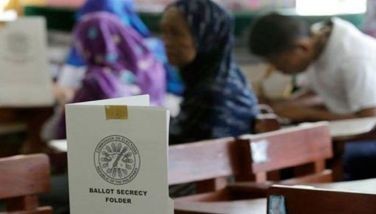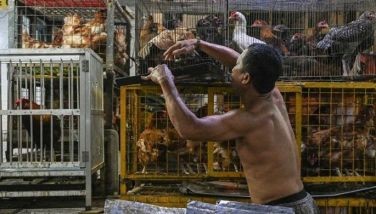CA acquits 19 in Lenny Villa slay
January 12, 2002 | 12:00am
Only two were found guilty of homicide.
The Court of Appeals (CA) convicted two and acquitted 19 of the 26 members of the Aquila Legis fraternity at the Ateneo Law School who were found guilty by a lower court of the fatal hazing of neophyte Lenny Villa during initiation rites in February 1991.
In a decision handed down yesterday, the appellate court also held four others liable for the lesser offense of slight physical injuries.
Another one — Efren de Leon — died in April 1996.
Caloocan City Trial Judge Adoracion Angeles ruled in November 1993 that all 26 respondents conspired with one another in the initiation rites that led to Villa’s death, and sentenced them to 14 years imprisonment, in addition to moral and exemplary damages amounting to more than P1 million.
Originally, there were 35 respondents, but the list was trimmed down to 26.
The CA ruling penned by Justice Eubolo Verzola indicated that there could be no conspiracy to commit a crime when the supposed victims were privy to the incident.
"Indeed, there can be no fraternity initiation without consenting neophytes," Verzola noted.
Justices Rodrigo Cosico and Eliezer de los Santos concurred with Verzola’s decision.
Convicted for homicide were Fedelito Dizon and Artemio Villareal who were sentenced to a maximum prison term of 17 years, plus damages.
Acquitted were Amante Purisima II, nephew of retired Supreme Court Justice Fidel Purisima; Etienne Guerrero, son of Deputy Ombudsman for Luzon Jesus Guerrero; Nelson Victorino, Eulogio Sabban, Joseph Lledo, Michael Musngi, Percival Brigola, Jonas Karl Perez, Ronan de Guzman, Paul Angelo Santos, Antonio General, Jaime Ma. Flores III, Dalmacio Lim Jr., Ernesto Jose Montecillo, Santiago Ranada III, Zosimo Mendoza, Vicente Verdadero, Jude Fernandez and Adel Abas.
Those held liable for slight physical injuries for inflicting on Villa "more than the usual punishment undertaken during initiation rites" were Vincent Tecson, Junel Anthony Ama, Antonio Mariano Almeda and Renato Bantug Jr. They were meted 20 days imprisonment and damages totaling P30,000.
In convicting Dizon and Villareal, the CA ruled that they were "motivated by ill-will" in reopening the initiation rites even if it was already concluded.
"The two (Dizon and Villareal) had their own axes to grind against Villa and (Bienvenido) Marquez III. It was very clear that they acted with criminal intent," the 24-page ruling stated.
The court noted that Dizon was angry at the 21-year-old Villa because of a row over a parking space between their respective fathers.
Villa was the son of the late Bureau of Internal Revenue Commissioner Romulo Villa.
On the other hand, Villareal was mad at Marquez because he suspected that the latter’s family had a hand in the death of his brother.
"The evidence on this matter is unrebutted and so for the death of Villa, Dizon and Villareal must and should face the consequences of their acts, that is, to be held liable for the crime of homicide," the CA ruled.
It added that the beatings dealt on Villa were "marked with excessive violence and clearly overstepped the parameters established by the fraternity to ensure safe initiation."
In tossing out the conspiracy theory, the court pointed out that fraternity neophytes "willingly and voluntarily" agree to undergo physical initiation or hazing.
"It is common knowledge that before admission in a fraternity, the neophytes will undergo a rite of passage."
"Thus they were made aware that traditional methods such as mocking, psychological tests and physical punishment would take place. They knew that the initiation would involve beatings," the CA said.
Justice Secretary Hernando Perez, himself a former Ateneo law professor, said the Villa family, who expressed dissatisfaction over the CA decision, could no longer seek the reversal of the ruling as it would result in double jeopardy.
While Perez acknowledged that an appeal or a motion for reconsideration would be entertained, he said judges and justices normally do not allow their original decision to be reversed.
As for Dizon and Villareal, Perez explained that seeking the help of the SC would not be advisable because of the risk of having the charges modified from homicide to murder.
The Court of Appeals (CA) convicted two and acquitted 19 of the 26 members of the Aquila Legis fraternity at the Ateneo Law School who were found guilty by a lower court of the fatal hazing of neophyte Lenny Villa during initiation rites in February 1991.
In a decision handed down yesterday, the appellate court also held four others liable for the lesser offense of slight physical injuries.
Another one — Efren de Leon — died in April 1996.
Caloocan City Trial Judge Adoracion Angeles ruled in November 1993 that all 26 respondents conspired with one another in the initiation rites that led to Villa’s death, and sentenced them to 14 years imprisonment, in addition to moral and exemplary damages amounting to more than P1 million.
Originally, there were 35 respondents, but the list was trimmed down to 26.
The CA ruling penned by Justice Eubolo Verzola indicated that there could be no conspiracy to commit a crime when the supposed victims were privy to the incident.
"Indeed, there can be no fraternity initiation without consenting neophytes," Verzola noted.
Justices Rodrigo Cosico and Eliezer de los Santos concurred with Verzola’s decision.
Convicted for homicide were Fedelito Dizon and Artemio Villareal who were sentenced to a maximum prison term of 17 years, plus damages.
Acquitted were Amante Purisima II, nephew of retired Supreme Court Justice Fidel Purisima; Etienne Guerrero, son of Deputy Ombudsman for Luzon Jesus Guerrero; Nelson Victorino, Eulogio Sabban, Joseph Lledo, Michael Musngi, Percival Brigola, Jonas Karl Perez, Ronan de Guzman, Paul Angelo Santos, Antonio General, Jaime Ma. Flores III, Dalmacio Lim Jr., Ernesto Jose Montecillo, Santiago Ranada III, Zosimo Mendoza, Vicente Verdadero, Jude Fernandez and Adel Abas.
Those held liable for slight physical injuries for inflicting on Villa "more than the usual punishment undertaken during initiation rites" were Vincent Tecson, Junel Anthony Ama, Antonio Mariano Almeda and Renato Bantug Jr. They were meted 20 days imprisonment and damages totaling P30,000.
In convicting Dizon and Villareal, the CA ruled that they were "motivated by ill-will" in reopening the initiation rites even if it was already concluded.
"The two (Dizon and Villareal) had their own axes to grind against Villa and (Bienvenido) Marquez III. It was very clear that they acted with criminal intent," the 24-page ruling stated.
The court noted that Dizon was angry at the 21-year-old Villa because of a row over a parking space between their respective fathers.
Villa was the son of the late Bureau of Internal Revenue Commissioner Romulo Villa.
On the other hand, Villareal was mad at Marquez because he suspected that the latter’s family had a hand in the death of his brother.
"The evidence on this matter is unrebutted and so for the death of Villa, Dizon and Villareal must and should face the consequences of their acts, that is, to be held liable for the crime of homicide," the CA ruled.
It added that the beatings dealt on Villa were "marked with excessive violence and clearly overstepped the parameters established by the fraternity to ensure safe initiation."
In tossing out the conspiracy theory, the court pointed out that fraternity neophytes "willingly and voluntarily" agree to undergo physical initiation or hazing.
"It is common knowledge that before admission in a fraternity, the neophytes will undergo a rite of passage."
"Thus they were made aware that traditional methods such as mocking, psychological tests and physical punishment would take place. They knew that the initiation would involve beatings," the CA said.
Justice Secretary Hernando Perez, himself a former Ateneo law professor, said the Villa family, who expressed dissatisfaction over the CA decision, could no longer seek the reversal of the ruling as it would result in double jeopardy.
While Perez acknowledged that an appeal or a motion for reconsideration would be entertained, he said judges and justices normally do not allow their original decision to be reversed.
As for Dizon and Villareal, Perez explained that seeking the help of the SC would not be advisable because of the risk of having the charges modified from homicide to murder.
BrandSpace Articles
<
>
- Latest
- Trending
Trending
Latest
Trending
Latest
Recommended


































